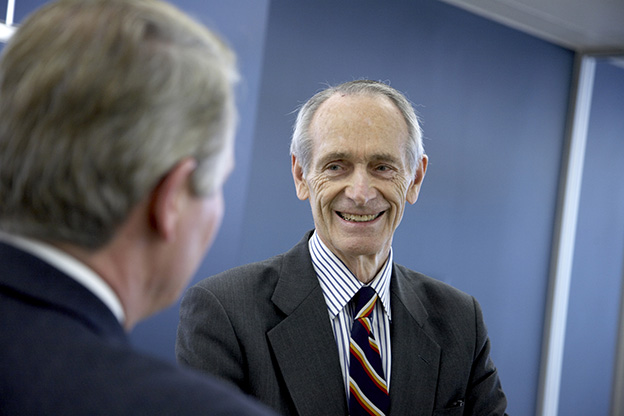Remembering medical revolutionary John Evans

It was 50 years ago that John Evans moved to Hamilton to set up what many considered to be the most innovative and curious medical school in Canada.
Accompanied by a hand-picked team of a few sought after physician educators and colleagues, John created the McMaster School of Medicine. As simple as that. Seven years later Evans left his success at McMaster to take on the University of Toronto, Allelix, the Rockefeller Foundation, TorStar and all the others.
When I was appointed dean of the McMaster medical school, I knew all about him and his many accomplishments, so it was with some trepidation that I called him seeking advice. This was fifteen years ago. He was the chair of TorStar. We had never met. I told him about the job I was about to start and he chuckled, saying that he didn’t know if congratulations or commiserations were in order. I asked if I could pick his brain. He laughed, as he always did, and said, “That should take about a minute.”
We met a few weeks later. What I thought would be fifteen minutes of hurried advice turned into a couple of hours of wonderful conversation. John would listen carefully, comment, ask questions. But what I remember most about that, and subsequent conversations, was his engaging smile and his rapt attention. Always undivided, always complete.
That day was the first of many times I finished a conversation with John feeling better about myself – more prepared, more ambitious, yet also more humble. That was also the day that I learned John Evans had yet another skill … he was a magician who could make you feel lighter than air. I left his office buoyed by the opportunity that lay before me. Problems seemed less significant and solutions felt closer at hand.
In the mid 1960’s, John Evans, James Anderson, Fraser Mustard, Bill Spaulding, Bill Walsh, and others were challenged to create a new and innovative medical school in Hamilton. Realizing that some physicians practiced medicine almost solely by referring to the knowledge gained during their medical training, Evans and his colleagues brought in the concept of self-directed, lifelong learning. The patient is never “a case,” but rather a person requiring the most thoughtful and up-to-date care.
Looking back, John Evans’ revolution in medical education was almost like the invention of the Post-It note: Once you see it, it’s so obvious in its usefulness and simplicity that it seems impossible that no one else thought of it earlier.
John did seem like a magician, however, and his greatest trick was there was no trick at all. No need for misdirection. Instead, every contribution he made was the product of a profound intellect, an overwhelming curiosity, and a precise and instinctive understanding of the demands and opportunities of a given moment. Like his medical training innovations, he was both revolutionary and comfortable, both groundbreaking and grounded.
Revolutionaries break rules: Why take four years to train a doctor when you can do it in three? Why have formal lectures when the best learning happens by students teaching each other? The list goes on.
But John Evans was unlike any revolutionary I have ever read about. Most are best admired from afar, but seldom appreciated up close. Some are best not approached at all. But for all of us who knew him, the better and closer we looked at John, the more we admired him.
He included so many of us in his revolution that his work will continue for generations. His legacy will prove the power of the exception.
That was John.
An edited version of this obituary appeared in the Globe and Mail on March 11, 2015.


